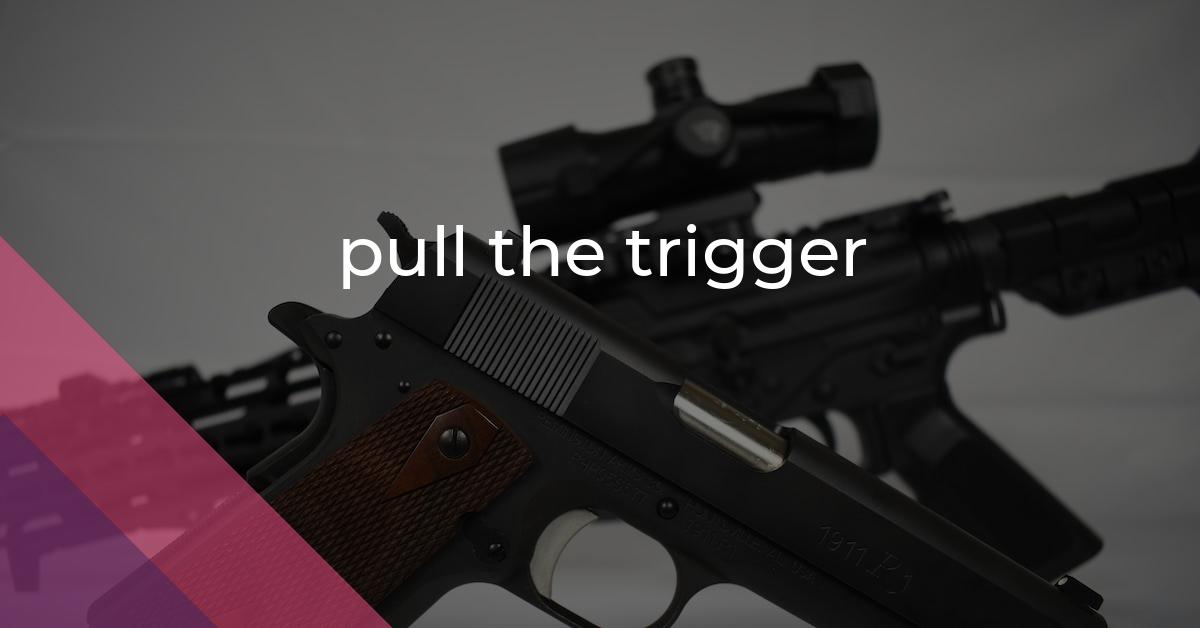pull the trigger: Idiom Meaning and Origin
What does ‘pull the trigger’ mean?
The idiom *pull the trigger* means to make a decision or take action, especially when it involves something significant or irreversible.

Idiom Explorer
The idiom "quick-fire" means to do or say something very quickly without much hesitation or delay.
The idiom *put the hammer down* means to take decisive action or to enforce strict measures.
The idiom "put a gun to someone's head" means to exert extreme pressure or force on someone to make them do something against their will.
The idiom "push it" means to try to make something happen or to encourage someone to take action. It can also refer to asking someone to go faster or work harder. The phrase is often used in a motivating or urging context.
The idiom "pull up on" means to arrive or show up at a location, often unexpectedly or with a sense of urgency.
The idiom "pull up" means to stop or bring something to a halt. It can also refer to stopping oneself or someone else from behaving in a certain way. The phrase can be used in various contexts such as driving, sports, or correcting someone's behavior.
The idiom "pull teeth" means a difficult or challenging task, often involving persuading or extracting information from someone who is uncooperative or reluctant.
The idiom "pull strings" means to use one's influence or connections to manipulate or control a situation in one's favor.
The idiom "pull out of the fire" means to save or rescue someone or something from danger or a difficult situation.
Unleashing Unspoken Actions
The idiom "pull the trigger" is a commonly used expression in the English language. It has a clear and distinct meaning that has evolved over time. The idiom originated from its literal usage, referring to firing a gun by pulling the trigger. However, it now refers to making a decisive or potentially irreversible decision.
One important fact about this idiom is that it gained popularity in the 20th century, coinciding with the increased usage of firearms and the influence of the military on language. Additionally, the phrase is often associated with action and the consequential nature of decisions. It implies finality and the commitment to follow through.
When someone says, "pull the trigger," they are urging or encouraging someone to make a choice or take action. The idiom conveys bravery, risk, and the ability to make difficult decisions under pressure. By using this idiom, people aim to convey urgency and importance, emphasizing the need to act decisively.
In contemporary usage, the idiom is commonly employed in various contexts. For example, it is used in discussions of business or personal decision-making, highlighting the need to take risks and seize opportunities. Additionally, it is often used in sports to describe key moments when an athlete needs to make a critical play or take a decisive shot.
The idiom "pull the trigger" also allows for interpretation and nuance. It can evoke different emotions depending on the specific context and individual perspectives. This versatility allows the idiom to capture a wide range of situations where impactful choices are made.
The idiom "pull the trigger" has solidified itself as a widely recognized expression in the English language. Its origins in firearm usage have transitioned into a metaphorical usage, representing the act of making a decisive decision. This idiom serves as a reminder of the importance of taking action and accepting the potential consequences that may follow. Its continued usage demonstrates its effectiveness in capturing the essence of the power of decision-making and the ability to initiate change.
The idiomatic expression "pull a lever" shares a similar meaning to "pull the trigger." While "pull the trigger" is often associated with making a choice or taking action, "pull a lever" refers to the act of initiating a process or set of events by completing a specific action. The idiom implies the ability to activate or control a mechanism that leads to an outcome, similar to pulling the trigger on a gun.
The idiom "pull a lever" can be used to describe actions that have a direct impact on a situation, often bringing about significant change or influencing the outcome of a particular event. This idiomatic expression is commonly used in discussions of politics or decision-making processes that require individuals to take decisive actions that will set a series of events into motion.
Similarly, the idiom "pull out" is related to "pull the trigger" in terms of the action and decision-making involved. However, "pull out" specifically refers to the act of withdrawing or removing oneself or something from a situation or a commitment. This idiomatic expression often carries connotations of retreat, discontinuation, or disengagement.
When someone says "pull out," they are indicating the need or desire to step back or remove themselves from a situation, whether it be a personal relationship, a business venture, or a military operation. Like "pull the trigger," "pull out" emphasizes the importance of making a decisive choice, but in this case, the choice involves ending or disassociating oneself from a particular circumstance or obligation.
The idioms "pull a lever" and "pull out" share similarities with "pull the trigger" in terms of decision-making and taking action. Each expression represents a specific type of decisive choice, whether it be initiating a process, removing oneself from a situation, or making a significant and potentially irreversible decision. These idioms provide a framework for understanding the importance of taking action and accepting the consequences that may follow.
Example usage
Examples of how the idiom "pull the trigger" can be used in a sentence:
- John finally decided to pull the trigger and buy the house he had been eyeing for months.
- After months of planning, the team pulled the trigger on their new marketing campaign.
- She hesitated for a moment but eventually pulled the trigger and resigned from her stressful job.
More "Action" idioms



